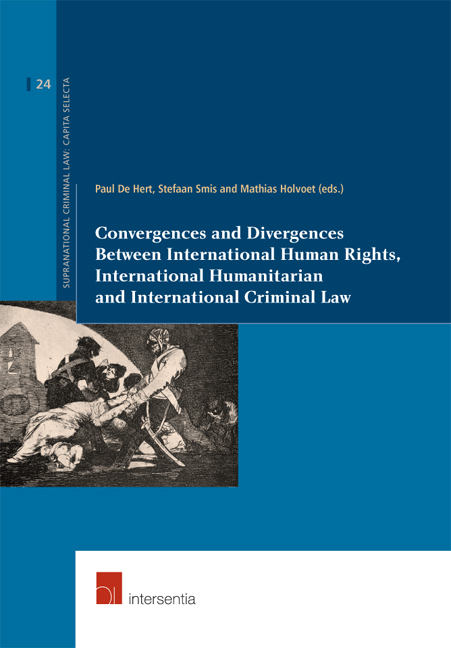Book contents
- Frontmatter
- Foreword
- Preface
- Contents
- About the Contributors
- Part I Convergences and Divergences between International Human Rights Law and International Criminal Law Stricto Sensu
- Catalytic, Gap-filling or Retardant Effects of Icl on Hrl: Quid Juris
- Use of Human Rights in International Criminal Law: Influence or Appearances of Legitimacy?
- The Future of the International Criminal Court: A Non-human Rights Body?
- Part II Convergences and Divergences between International Human Rights Law and Transnational Criminal Law
- Part III Convergences and Divergences between International Human Rights Law and International Humanitarian Law
- Conclusion
- Index
- About the Editors
Use of Human Rights in International Criminal Law: Influence or Appearances of Legitimacy?
from Part I - Convergences and Divergences between International Human Rights Law and International Criminal Law Stricto Sensu
Published online by Cambridge University Press: 11 October 2018
- Frontmatter
- Foreword
- Preface
- Contents
- About the Contributors
- Part I Convergences and Divergences between International Human Rights Law and International Criminal Law Stricto Sensu
- Catalytic, Gap-filling or Retardant Effects of Icl on Hrl: Quid Juris
- Use of Human Rights in International Criminal Law: Influence or Appearances of Legitimacy?
- The Future of the International Criminal Court: A Non-human Rights Body?
- Part II Convergences and Divergences between International Human Rights Law and Transnational Criminal Law
- Part III Convergences and Divergences between International Human Rights Law and International Humanitarian Law
- Conclusion
- Index
- About the Editors
Summary
INTRODUCTION
The complex relations between human rights and criminal law range from rejection and respect to influence and disunity. The tortuous interaction between both bodies of law fascinates many authors. For instance, van de Kerchove has questioned whether human rights should be considered as the shield or the sword of criminal law. The relationship of international criminal law (ICL) with human rights law (HRL) is no exception to the rule. Indeed, at the international level, a true ‘judicial dialogue’ has been developed between international criminal courts on the one hand, and human rights protection bodies on the other hand, such as the European Court of Human Rights (ECtHR). The relation between the two corpuses of law, and especially the recourse to international human rights law (IHRL) by international criminal courts, is very complex given that abundant so-called cross-fertilisation is taking place between both branches of law. In this chapter, only the recourse to IHRL by international criminal tribunals and courts will be analysed.
This chapter proposes analysing this recourse along three axes. First, ICL can be analysed as a repressive form of human rights: the purpose of ICL in prosecuting some international crimes is to condemn massive violations of human rights. Consequently, IHRL is used in order better to interpret elements of definition of international crimes. Secondly, human rights can be understood as an important source of law allowing the development of international criminal procedure. Indeed, the Strasbourg case law, for example, has clearly influenced the International Criminal Tribunals (ICTs) for both the former Yugoslavia and Rwanda (respectively ICTY and ICTR), in the interpretation of rights of the accused. Thirdly, the reference to HRL could be analysed as a means of legitimising ICL, especially related to what Cassese has called the ‘universal values legitimacy’.
Following the lines of these three axes, this chapter will be divided into three parts. First, the chapter will present how ICL as an enforcement mechanism of human rights makes use of IHRL, more specifically to define and interpret certain crimes, such as crimes against humanity (see below section 3). Then, some cases in which international criminal tribunals and courts will be presented, taking into consideration HRL in order to determine rights of the accused (see below section 4).
- Type
- Chapter
- Information
- Convergences and Divergences Between International Human Rights, International Humanitarian and International Criminal Law , pp. 29 - 48Publisher: IntersentiaPrint publication year: 2018



